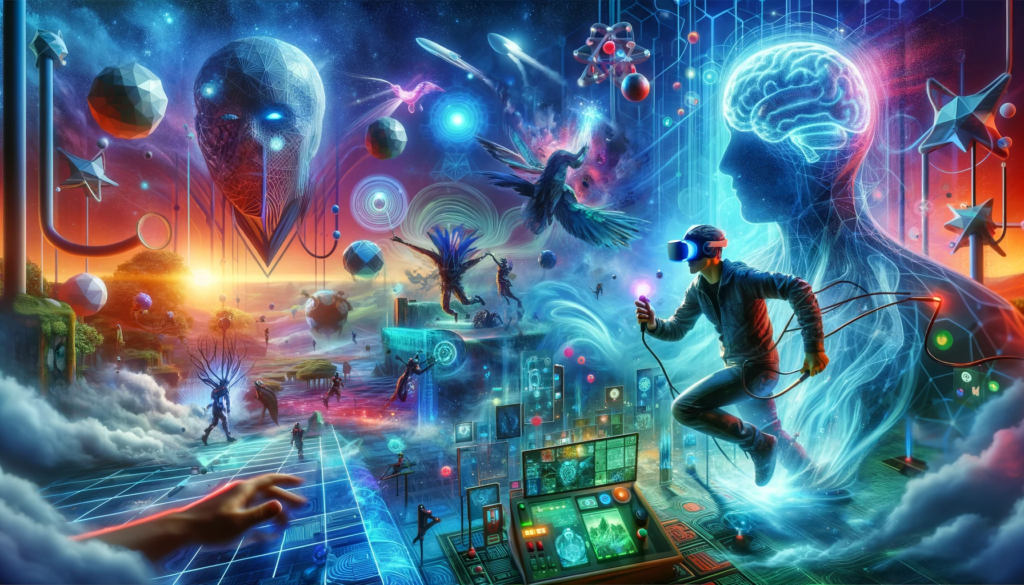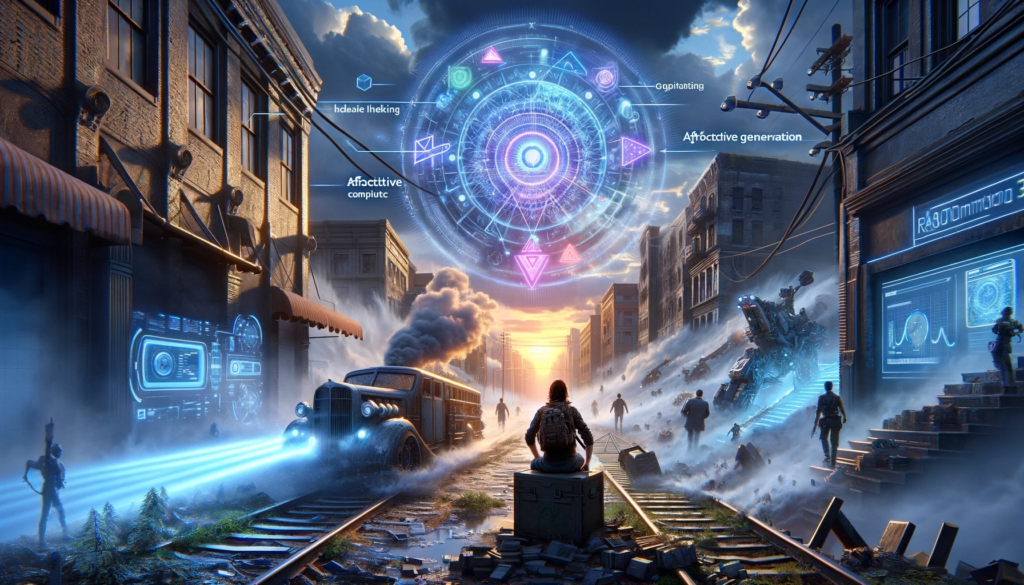Ever wondered how our modern games came to be so different from the pixelated classics we once knew? As we approach 2024, the gaming industry isn’t just changing – it’s evolving at an incredible speed. We’re seeing everything from virtual reality to blockchain technology reshaping the world of game development.
But what’s behind these changes? What lies ahead for us gamers? Let’s delve into the technological advancements in game development, uncovering what’s evolving and what’s on the horizon. Ready to level up?
Enthralling adventures
Picture gaming where you’re not just watching but actively participating in a whole new world. That’s the magic VR and AR offer. It’s more than observing a different reality; it’s about fully experiencing it. Haptic feedback lets you touch and interact with this world, making it tangible. Spatial audio is the cherry on top, filling this world with sounds that seem to come from all around you.
And the future? It’s looking at brain-computer interfaces, turning your thoughts into the ultimate game controller. This isn’t just a leap in gaming, it’s a revolution, transforming how we play, interact, and experience games. And the exciting part? We’re just at the beginning.

Growth through decentralisation
Now, anyone can create and play games, not just the tech-savvy. It’s like handing out keys to a game development studio. The open-world design blurs the lines between player and developer; you’re not just playing, you’re shaping. This democratisation is changing the game, creating a space where everyone can contribute, create, and enjoy. It’s a fresh, inclusive future for gaming, and we’re all invited.
Challenging the limits
Games now transcend mere victory or defeat; they immerse us in worlds nearly as vivid as reality itself. Hyper-realistic graphics blur the lines between the game and actuality, making it challenging to discern where one ends and the other begins. But the innovation doesn’t stop there. Procedural generation ensures every gaming session is a new adventure, offering dynamic experiences that are never the same twice.
The real kicker, though, is affective computing. This technology allows games to tune into our emotions and adjust the gameplay accordingly. Feeling tense? The game might dial down the intensity. Need a thrill? Expect the unexpected. It’s like the game is in sync with you, creating a deeply personal and engaging experience.
This is true whether you’re exploring vast open worlds, solving intricate puzzles, or even playing a round of your favourite card game online. And if you’re looking for a bit of that old-school casino thrill, real pokies online could be just the ticket. You can find a guide that highlights the best casino games, where you can enjoy thousands of them along with awesome bonuses.

A new era in ownership
Thanks to blockchain and NFTs, players can now truly own their in-game assets. It’s not about just earning a high score or collecting virtual coins anymore. Players now can own, trade, and sell game assets, mirroring physical ownership. This shift is forming digital economies within games, offering fresh avenues for player interaction. It’s a revolutionary change, bringing a new dimension to gaming interactions and playstyles.
Moving beyond the screen
Educational games are making learning fun and engaging, while health and wellness games are turning exercise into an exciting challenge. The distinction between play and purpose is fading, benefiting us all. Games are becoming more accessible, welcoming everyone regardless of abilities. It’s a big move toward an inclusive gaming world. Virtual workspaces are also gaining prominence. They’re transforming the way we work and collaborate, all while adding a touch of fun. It’s like taking a bit of the gaming world into our work life.
Embracing the future of gaming
As we stand at the precipice of a new era in gaming, it’s clear that the boundaries of what we once thought possible are continuously being redefined. From the enthralling adventures offered by VR and AR to the hyper-realistic experiences blurring the lines between reality and virtual worlds, gaming is undergoing a profound transformation.
The innovations don’t stop there. The advent of brain-computer interfaces and affective computing heralds a future where gaming is not only a visual and tactile experience but also an emotional journey. Games are becoming more than just a pastime; they are evolving into platforms for learning, wellness, and even transforming our professional lives.
In this dynamic landscape, the role of blockchain and NFTs is pivotal, giving rise to new forms of digital ownership and participation. The democratisation of game development, fueled by these technologies, is creating a gaming ecosystem that is more inclusive, diverse, and accessible than ever before.

As we navigate these changes, one thing is certain: the world of gaming is not just keeping pace with technological advancements; it is at the forefront, pushing the limits of creativity, innovation, and human interaction. Whether you’re a gamer, developer, or simply a spectator of this evolution, one thing is clear – we are all part of a thrilling journey into the unknown realms of possibility. The future of gaming is not just about playing; it’s about experiencing, learning, and growing in ways we have yet to imagine.
Ready to level up? The next chapter of gaming awaits, promising adventures more captivating and immersive than ever before.
For even more opinion pieces like this, click right here.